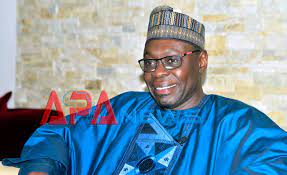The Senegalese candidate for the post of Director of the WHO Africa Office is in competition with a Nigerien, a
Rwandan and a Tanzanian, for the election which is due to take place in just over a month’s time.
In an exclusive interview with APA, Dr. Ibrahima Soce Fall, a candidate for the post of Director of the World Health Organization’s (WHO) Africa Office, described his extensive career in public health and set out his priorities in the hope of being elected to this strategic post.
He is competing against three other candidates, Boureima Hama Sambo from Niger, Richard Mihigo from Rwanda and Faustine Engelbert Ndugulile from Tanzania.
For this election, scheduled for 26-30 August 2024 in Brazzaville, Republic of Congo, the WHO Regional Committee for Africa will vote on the seventh head of the institution at a closed session of its 74th
meeting, to be held in the meantime.
Ibrahima Soce Fall, 58, who enjoys the support of the highest authorities in his country, including from President Bassirou Diomaye Faye, who has received him in audience, will be one of the attractions of the meeting. A military doctor by training, he began his career in the Senegalese army as a doctor in a conflict zone in Casamance, in the south of Senegal, where the MFDC (Movement of Democratic Forces of Casamance) independence movement has been active for over 40 years.
Dr. Fall then turned his career towards public health, working on the fringes before joining the army health service and then becoming a university lecturer.
“I joined the WHO as part of the fight against malaria, where I held a number of key positions, including director of emergencies and assistant director-general,” the doctor-colonel explained.
Africa’s century
Motivated by a deep commitment to the continent, Dr. Fall says he is ready to strengthen African health systems if he is elected as the successor to Botswana’s Matshidiso Rebecca Moeti, the outgoing WHO Director-General for Africa.
“It’s time for Africa. We must take our destiny into our own hands and not wait for others to do it for us,”
he says.
His priorities include strengthening health systems, improving the quality of care, preparing for and responding to emergencies, and combating neglected tropical diseases and non-communicable diseases.
Its campaign slogan, “This is Africa’s Century,” reflects an integrated vision of public health. “Health for all and all for health, everywhere. Health must be reflected in all sectoral policies if it is to have a lasting impact,” he stressed.
One of Dr Fall’s most memorable experiences was managing the Ebola epidemic in West Africa between 2013 and 2016. At the time, he was the WHO representative in Mali when the epidemic broke out in Guinea.
“We had to change all our strategies and really reach out to communities to defeat this epidemic. And we succeeded,” he says, insisting on the importance of a strong community-based approach.
To improve healthcare on the continent, the Senegalese is proposing closer cooperation with African governments, tailored to the specific needs of each country.
“Universal health coverage and health promotion are essential to our work,” he asserts.
The greatest health challenges on the continent include the prevalence of infectious and non-communicable diseases, the quality of care, and the impact of climate change and urbanisation. ‘A coherent approach to
health that integrates all sectors is needed to meet these challenges’, according to the Senegalese candidate for the post of WHO Director for Africa. He stresses the importance of a coherent policy to attract and retain medical talent, particularly in rural areas.
“Investing in local development and creating favourable conditions for health professionals is therefore crucial,” he argues.
ODL/Sf/te/fss/as/APA


